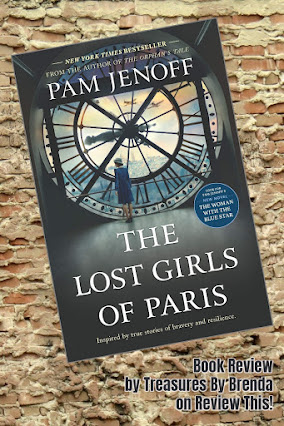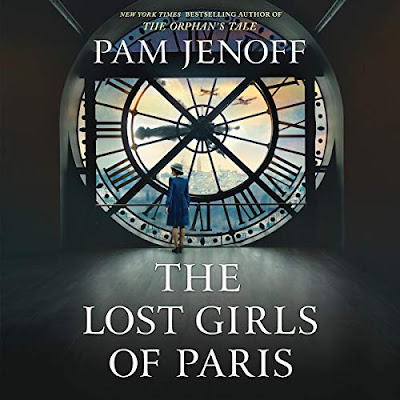With the novel The Lost Girls of Paris by Pam Jenoff, I once again reviewed life in Europe during and just after World War II. The book is fictional but based on the true story of Vera Atkins and her female special operations agents.
THE STORY
I struggled at first to settle into the pages of this book but when I did, I was rewarded with the story of a woman named Eleanor Trigg and a group of women she recruited and trained to become secret agents. Those women would eventually be sent from England to occupied France as part of the resistance movement’s effort to disrupt the advance of the German army. The women were employed as couriers and radio operators and were eventually lost.
REVIEWS
Reviewers on Amazon peg the book quite correctly as romantic in nature. Some question some of the historical facts and many of the decisions made by characters in the book. Some felt that the book had too many coincidences and that it did not always ring true. However, despite these criticisms, the book received 86 percent four- and five-star ratings, which does not seem too bad to me so I looked further.
U.S.A. Today called this Jenoff work of fiction “a gauzier, more florid and awkwardly romantic account” of the true story of Vera Atkins and her team of spies saying that the book has “all of the tension of a Hallmark card.” I agree. It definitely is romantic and nice version of the story and is not the best historical fiction book from that time period that I have read.
Kirkus calls the book, “a sadly slapdash World War II adventure”, which references, I believe, some of the factual problems readers have with this book. The problems are in errors with the details. Did diners (restaurants) have television sets in the 1940s? Would those TVs have been broadcasting the news while diners ate their meals? How could you have planned a honeymoon aboard the Queen Elizabeth II, which was not built until the 1960s? Was renting a car possible in those days? Were the terms single mother and Ms. in use? Was duct tape available to the public or just the military? How many states were there in the United States in 1946? I have not fact checked any of these questions and some of them I did not jump out at me when I was reading the book. A few of them could have and hopefully have been easily corrected in subsequent printings.
Finally, the readers at Goodreads give The Lost Girls of Paris a score of 3.88. Once again, that score is not too bad in my opinion. On that platform, reviewer Matthew said, “I liked the story, but in the realm of WWII fiction it is not in the upper echelons. Maybe you will enjoy it more than I did and can look past the issues…” Personally, I am inclined to agree with that score on Goodreads and with Matthew’s comments.
If you enjoy historical fiction set in World War II, Europe, or if you are looking for a book with interesting female protagonists, you should enjoy this book. That is, if you are willing to accept it as written and not be tripped up by historical inaccuracies like those referenced above.
If you want to learn more, you can find The Lost Girls of Paris on Amazon by clicking right here. If you do read the book, be sure to come back and let us know what you think.
I will end with a question. How important is historical accuracy to you in your historical fiction books? Do mistakes like those mentioned above ruin a book for you or are you happy to discount them as part of an author’s work at crafting a compelling story?
See you
At the book store!
Brenda
More World War II Fiction:































Brenda, your always honest review of a book is greatly appreciated in helping us decide whether or not to read it. Truthfully, in my opinion, in historical fiction, and also in such movies, I think it is important for an author to fact-check before including things in a story that would not have been available in that time period. As such, an author may craft a well written story, but have the reader think less of the work from being distracted by the inaccuracies. Also, a reader of historical fiction does so to enjoy being immersed in that time period. Being transported back to World War II time, the reader does not want to be jolted back to present times by the presence of inaccuracies. Just my opinion. :)
ReplyDeleteI agree though I will admit not all of the inaccuracies jumped out at me. Definitely, however, the television in a diner had me wondering and while not impossible it certainly seems improbable. Thanks for the visit, Elf.
DeleteI enjoy historical fiction, but I do appreciate and expect diligent research for correctness and facts. Thank you for this review.
ReplyDeleteExactly, Joan. Thanks for the visit!
DeleteThank you for a honest review of this book. I too enjoy historical fiction.
ReplyDeleteThere seem to be a lot of who enjoy historical fiction. Glad to share, Mary Beth.
DeleteWhile I have no doubt this would be an enjoyable read for pure romantics, I do prefer, almost demand, that a book in the historical fiction genre be accurate. I expect an author to research facts. It would bother me a lot to see historical inaccuracies like the ones you mentioned. So much so, I doubt I would read to the end of the book. I am most grateful for your honest review.
ReplyDeleteYou are welcome, Mouse. As you have said accuracy is so important.
DeleteAs I continue to think about this review, I couldn't help but consider how sad that the author didn't do her due diligence for historical accuracy. Since the women were real, it would have been very interesting to learn about them and their work, but I would question everything she says about the women based on the other obvious inaccuracies. Such a shame!
DeleteYes and editors usually fact check, too. I notice just now that there are several non-fiction books available and even a recent movie telling Vera Atkins true story. I may look some of them up.
DeleteIf it is taken as a novel based on some facts, it is a very good read. I enjoyed it as part of many books I have read about this time period. There are many novels about this time and I have found many that are interesting reads. Accuracy would be nice but not so important if it is a NOVEL. Thanks Brenda for your review.
ReplyDeleteThanks Olivia and I agree, it was a good story one of many in an interesting genre of books.
ReplyDeleteI also love historical fiction. I can live with a few inaccuracies as long as the book is interesting to me. Although some of those inaccuracies you mention do stand out. I would think a diner my have a radio in the era, but not a television. It still sounds like a very good book. Thanks for the review.
ReplyDeleteYou are welcome, Sam. Televisions did exist then so it was possible it just felt odd for the character to go into a diner and see some breaking news (related to the story) on a television.
DeleteI love historical fiction as well. While I much prefer that it be as historically accurate as possible, sometimes I am willing to overlook a few intentional, minor embellishments of the facts in the interests of good storytelling, as long as most of the book reflects the period accurately. However, I consider an evident lack of due diligence by an author who chooses the historical fiction genre inexcusable. Thanks so much for sharing your balanced, honest review, as always!
ReplyDeleteYou are welcome, Margaret.
DeleteNot that I could ever write historical fiction, but I wouldn't attempt it for the one main reason - that I would expect a lot of research and fact checking to be necessary. So yah, while I would want the book I read to be historically accurate, unless I was aware of specifics, I may not notice them. I'm a huge fan of the Outlander TV Series - and I have found myself watching for potential errors - but it's a time traveling movie so it gets a pass lol!
ReplyDeleteWe're watching Outlander, too. I'll have to ask my husband (history major) if he has noticed any inaccuracies. He often comments on a program when it gets something wrong.
DeleteThank you for your thorough and honest review. I think from your description that it is based on the true story but is fictional, that I could enjoy it for what it is. With regard to the historical inaccuracies I think to enjoy it you would have to suspend disbelief a bit and just go with it for the sake of the story. I suppose for me it would depend how jarring the inaccuracies are and how much I notice them once into the book.I would prefer it to be researched and totally accurate as it is based on a true story and real people but the author decided not to go that route, so taken as a fictional novel it sounds a nice read.
ReplyDeleteIt was a good story, Annie and it peeked an interest in the true story so maybe that is a good thing, too.
Delete